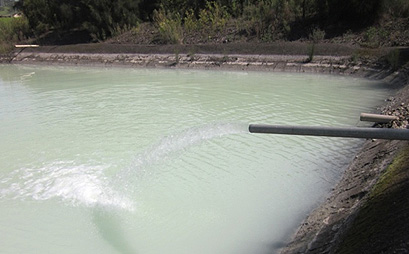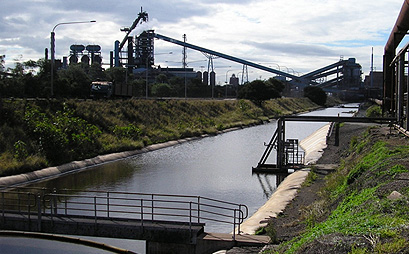Conserving water at Tata BlueScope Steel

Water consumption at Tata BlueScope Steel has reduced by more than a third since 2009, with management instilling a culture of using water wisely and recycling whenever possible.
The campaign started with water meters installed at significant water usage points to enable daily water consumption to be closely monitored, and a check of all pipes for any leaks. Other water saving initiatives include:
- Electronic level switches and float valves are used to reduce consumption
- A sewage treatment plant treats water for use on gardens
- A rainwater harvesting system has been installed to capture water for recycling that would otherwise have been fed into drains
- Lawns and gardens are watered early morning or late evening to help reduce water evaporation
- Water spray jets are no longer used for cleaning buildings
Pocket cards distributed to employees offer a range of tips to save water, both at work and at home.
Improved water efficiency at Port Kembla Steelworks

A number of dams at the Port Kembla Steelworks hold water that is used to suppress dust around the site. Stormwater and process water from the Recycling area is channeled to a four megalitre dam, which overflows via gravity to an adjacent nine megalitre dam during periods of heavy rain. A pump has now been installed to allow water to be transferred back to the smaller dam when water levels are low. This water is then used to suppress dust in the Metal Recovery plant, and to suppress dust and cool the metal bays after plating of molten iron.
Previously, the 4 Meg Dam was topped up when required by Industrial Water. Having the means of returning 9 Meg Dam water to the 4 Meg Dam via a pump and pipe line installed between the two dams removes the need to use industrial water to top up the 4 Meg Dam and leads to a direct cost saving. It will also ensure the 9 Meg Dam can receive water from any other sources identified in the future.
Reduced fresh water consumption in coke ovens runoff
 The Coke Ovens Recovery Basin (CORB) collects and recycles runoff water from the Cokemaking area to minimise discharge to the main stormwater drain in the Port Kembla Steelworks. The closure of No.4 Coke Ovens Battery in 2011 reduced the demand for the recycled CORB water by 680 kL /day, which resulted in the need to manage excess water through continuous discharge to the main drain.
The Coke Ovens Recovery Basin (CORB) collects and recycles runoff water from the Cokemaking area to minimise discharge to the main stormwater drain in the Port Kembla Steelworks. The closure of No.4 Coke Ovens Battery in 2011 reduced the demand for the recycled CORB water by 680 kL /day, which resulted in the need to manage excess water through continuous discharge to the main drain.
This project involved developing a solution to reduce discharge to the main drain. The option selected and implemented has diverted water from the 7 Battery quench system that would have previously flowed to the CORB for use in another part of the cokemaking facility. This has had the additional benefit of significantly reducing the plant’s demand for purchased industrial fresh water (typically 650kL/day), thus saving $400,000 per annum.
In short, the $700,000 investment has resulted in significantly lower industrial fresh water demand, reduced operating cost, reduced runoff waters discharged to drain, and improved environmental protection and process security for the plant.
